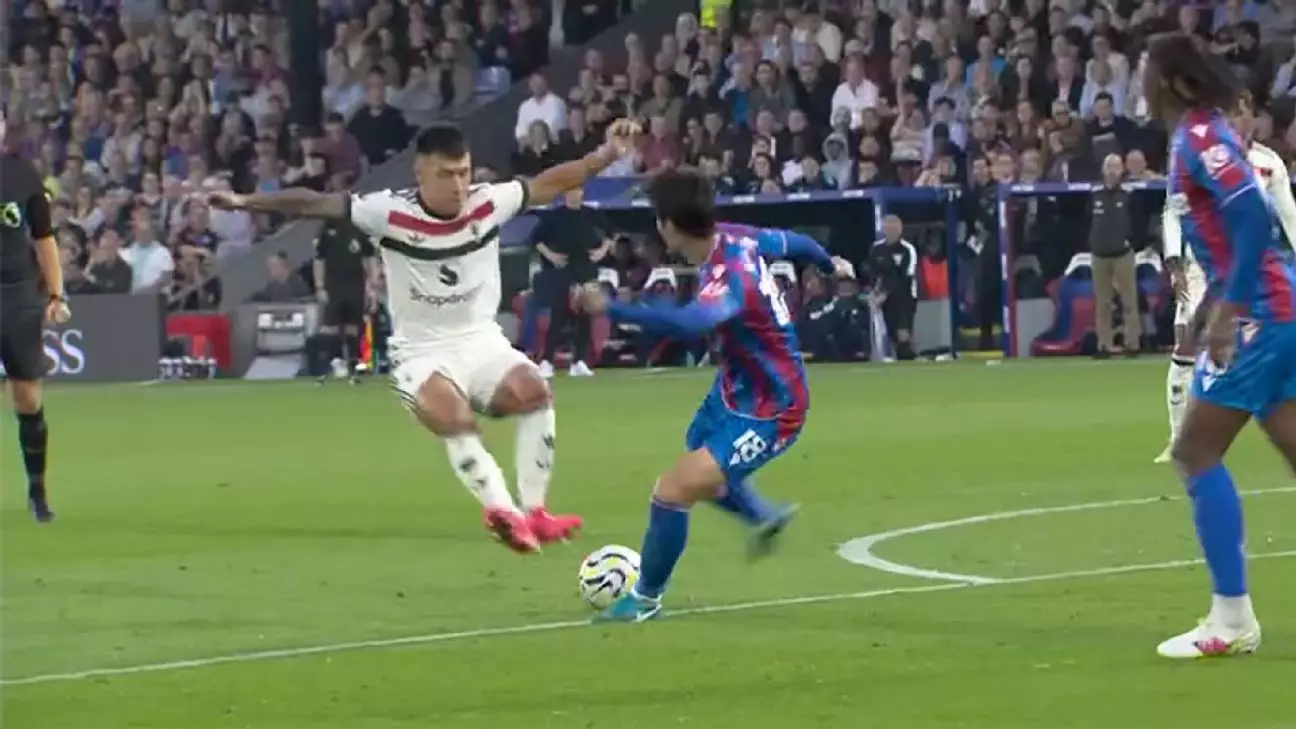The integrity and fairness of officiating in football are pillars upon which the game stands. The Independent Key Match Incidents (KMI) Panel of the Premier League plays a critical role in appraising contentious decisions made during matches. Recent findings from the panel highlight the complexity of officiating decisions, reflecting not only the nuances of the game but also the stringent guidelines under which referees and the Video Assistant Referee (VAR) operate.
In a notable clash during the recent fixture between Manchester United and Crystal Palace, defender Lisandro Martínez faced scrutiny for a challenge on Crystal Palace’s Daichi Kamada. Although Martínez was cautioned with a yellow card by referee David Coote, the subsequent VAR review by Chris Kavanagh opted not to escalate the incident to a red card. What surfaced was a stark division between public perception and the rules governing such moments.
The KMI Panel’s findings were particularly intriguing as they acknowledged the absurdity of Martínez’s challenge while upholding the referee’s original decision. Their statement emphasized that while Martínez executed a dangerous challenge, the absence of contact with Kamada justified the yellow card. This minimalist interpretation rests on UEFA’s guidelines, which dictate that actions without contact warrant less severe punishment. The panel’s observations that the challenge has “no place on the pitch” reflect broader concerns about player safety, suggesting that even when rules permit certain actions, the spirit of the game calls for more stringent self-regulation.
Each weekend in the Premier League unearths several contentious incidents, extending beyond the Martínez case. For example, the KMI Panel backed Michael Oliver’s decision to give Arsenal forward Leandro Trossard a second yellow card for delaying play during a match against Manchester City. This decision was made amid a landscape of interpretations of what constitutes an offense serious enough for a second caution.
Interestingly, while Oliver’s choices received a nod of approval, the panel’s assessment did not universally extend to other refereeing decisions. Morgan Gibbs-White’s dismissal for Nottingham Forest raised eyebrows among the panel members. A split vote highlighted the subjective nature of grasping the threshold for what constitutes a reckless challenge. The nuances in managing the intensity of tackles remain a gray area for all involved, underscoring the difficulty referees face when balancing strict adherence to rules with the dynamic nature of football.
VAR hasn’t been devoid of controversies either. In a close examination of incidents, the panel found that while certain erroneous decisions were made on the pitch, they did not meet the criteria for VAR intervention. For example, the panel concluded that referee Tony Harrington should not have awarded a penalty in a match between West Ham and Aston Villa. Meanwhile, a missed penalty opportunity for Ipswich Town at Manchester City presents another layer of complexity.
The infallibility of VAR is often shrouded in scrutiny, and the current season’s statistics provide a robust benchmark for assessing its effectiveness. Compared to previous seasons, the number of incorrect VAR decisions appears to have decreased substantially. Last season had recorded seven errors at this juncture, suggesting that the ongoing adjustment and refinement of the VAR system may be yielding results. However, the confidence in VAR remains a hot topic for players, fans, and pundits alike, highlighting the ongoing quest for clarity in officiating decisions.
The KMI Panel serves a dual purpose in the ecosystem of Premier League football. It not only assesses and clarifies challenging referee decisions but also proposes recommendations aimed at improving the overall standard of officiating. Through its careful exploration of key incidents, the panel demonstrates that while rules are essential, interpreting them in the context of the sport is equally crucial.
As the season progresses, it will be fascinating to observe how the lessons drawn from these incidents manifest in future matches. The push for enhanced player safety and fairness must not only be entrenched in regulations but also be reflected in the habits and attitudes of all stakeholders in the game. Moreover, the interaction between referees, VAR, and the KMI Panel is likely to evolve, with increased dialogue and reflection on the precedents established thus far.
The Premier League’s recent controversies serve as a microcosm of the challenges faced in football officiating. As the KMI Panel sheds light on the intricacies of key match incidents, it contributes critical insights toward refining rules that govern the beautiful game, ensuring that fairness and safety remain at the forefront of its operations.

